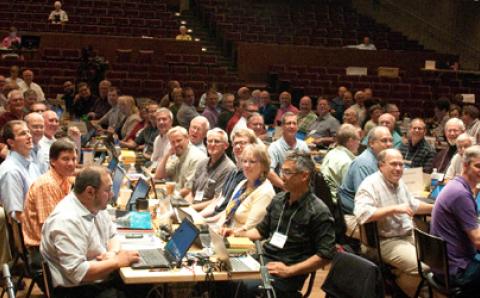Editor’s note: Christians agree that sexuality is a gift from God. But should the church provide guidance on people’s sexual behavior? If so, what principles should it use? Until now, the position of churches has been primarily limited to the prohibition of sex before marriage. But how, then, are single people supposed to live out their sexuality? Here are two perspectives to begin the conversation.
Single and Sexual: As God Created Us
by Chelsey L. Harmon
In keeping with his great wisdom, God designed and created men and women as sexual beings. Somewhere along the way our understanding of sexuality became mostly about sex—that sacred union intended exclusively for married people. But what about people who are widowed or divorced, who are purposefully celibate or functionally single, or who are “single and ready to mingle”? What are they supposed to do with their sexuality?
Offering pastoral and practical advice for the diverse variety of single people in the church is no small task. Perhaps the best place to begin is by telling the truth about sex, sexuality, and identity.
First, it’s important to distinguish between sex and sexuality. They’re not the same thing. Sex is what we do, sexuality is what we are. Although as a single person you may not be having sex right now, sexuality is for always. It’s an essential part of your being. Even in the new heaven and new earth we will be sexual beings because we’ll still be male and female. Our physical bodies matter. Look no further than the incarnation, when God took on flesh—including a sexual nature. Our whole selves matter to God and therefore should also matter to us.
Second, your experience of sexuality isn’t something to be conquered or mastered. Anyone who tries to make you believe that is wrong. You aren’t going to be able to defeat or avoid physical attraction and the desire for intimacy. That God-made desire for intimacy can be expressed in any number of ways, from a meaningful conversation with a friend or the hug of a child to the sexual union of two people. Just because you aren’t experiencing some of these forms of intimacy doesn’t mean you don’t—or shouldn’t—have the desire to experience them. Nor is it right for you to believe that you must experience all forms of intimacy in order to be “complete.” Consider Jesus, a fully human man who never had sexual intercourse. Would you describe his existence as incomplete? Sex is not integral to our identity; intimacy is.
Third, we need to acknowledge how difficult we often find this sexual part of our life, how easy it is for us to sin and to find ourselves separated from others and from God. God certainly made us good as sexual beings, but as soon as sin entered the world, our sexuality became a source of isolation. “It feels good” is never enough justification for doing anything. Rather, in all things, including what we do in our minds and with our bodies sexually, we are meant to give glory and honor to God. Being married doesn’t safeguard us from sexual sin either; in fact, it simply adds to the number of opportunities we have to sin.
So what are we to do? I’d like to suggest three ways God invites us to explore how we’re made.
1. Be honest in safe places. When we open up to God in prayer and to one another in love and name the things that are shaping our life, the Holy Spirit finds more access points into the core of our being and we become more teachable. Think about it: if it wasn’t good for Adam to be alone in the Garden of Eden, when literally everything was supposed to be right with the world, then it really isn’t good for you to be alone now. God uses community to support, encourage, challenge, chastise, and shape us, so we must submit to the discipline and blessings of relationships.
The good news is that, in our culture, most of us get to choose whom we share our lives with. Singles are blessed to experience intimacy that goes beyond bloodlines, and our relationships point to the greater truth that all of God’s people are family, brothers and sisters in Christ. So surround yourself with people who are both similar and different from you, people who will both support and challenge you. You may be surprised by the roles your friends take on.
2. Be yourself. Get to know who you are. Be ethically and morally responsible, but don’t be afraid to explore how you are a sexual being. Remember, you were made by God’s good design.
Be physical: play sports, get a massage, take a long walk. Be beautiful and loving: when another human being desires you, be reminded of how much more God desires you. How does being desired make you feel? How does it feel to desire another? How do all of these things make your body feel and your heart and mind react? Wonder and learn in community, through the study of Scripture and other trustworthy sources, and, inevitably, through confession and repentance, seeking to be faithful in all things.
3. Be empathetic. Try to understand where people are coming from. Much of other people’s reactions, comments, and worries about your singleness and sexual expressions aren’t actually about you. In fact, much of what they say on the subject is an expression of their own fears. Some people may be afraid that your singleness threatens their marriage. Some will never understand that men and women can be “just friends.” And some others always will think that all men think about is sex.
Though we are accountable to one another, you shouldn’t feel the extra burden of carrying false perceptions. In all things, remember that you have an audience of one—the One who desires more than just your devotion and right living. God desires all that you are. So whether single or married, strive to live with integrity as God intended.
If you’re single, my hope is that this may serve as the starting point of a conversation and journey of learning for you. May you discover the beautiful person God lovingly created to flourish, even as a “party of one.”
Chelsey Harmon is associate pastor at Christ Community Church in Nanaimo, British Columbia.
Where Do We Draw the Line?
by Harry Van Belle
The record of the church when it comes to sex has not been stellar. It has, in fact, been characterized by the denial of sex. For much of its history, the message of the church to young people has been one of abstinence. If you wanted to become a full-time servant of God, your best bet was to become a nun or an unmarried priest—a prejudice that lingers to this day in churches that admonish their young people to abstain from sex until marriage.
This admonition about lovemaking is ironic, as anyone who practices sexual intercourse knows. That’s because good sex can only happen in a relationship where the partners are able to let go, to passionately surrender to one another. By contrast, the North American obsession with performance in sexual relations—Viagra-induced or not—spells death to a relationship where you need to know yourself received, warts and all, by the other. The real goal of lovemaking is not the pursuit of technical expertise but the enjoyment of romantic intimacy, as the Song of Songs so poetically unfolds.
Nor is this prohibition about sex biblical. If I read Ecclesiastes and the Song of Songs correctly, then God wants people to take pleasure in their youth—and that pleasure most certainly includes lovemaking. Could it be that God is less hung up about sex than we are, especially in North America?
Premarital Sex
Whether Christian single people should or should not practice premarital sex is a question that may have been relevant two or three generations ago, but the situation today has changed.
First, whereas in earlier times the practice of sexual intercourse among unmarried youths realistically could—and often did—result in pregnancy, today’s young people have a variety of contraceptives at their disposal to minimize that risk. What’s more, young couples generally practice “safe sex” to prevent sexually transmitted diseases.
Second, for all kinds of good reasons, people today tend to remain single a decade longer than their parents and grandparents did. During their 20s, many people are in a semi-dependent financial state and perhaps are still in school. They generally do not feel ready to marry and start a family before they reach their 30s.
Their situation is comparable to that of their grandparents in Europe several generations ago when, because of a severe housing shortage, young couples were often engaged to be married for longer than a decade. In the meantime they did have unprotected sexual intercourse, resulting in a large number of what used to be called “shotgun marriages.” Young couples today are more likely to solve this dilemma by deciding to move in together. Many North American churches frown upon such relationships.
The question is whether they should.
Recreational Sex
An increasingly common form of premarital sex in our culture is recreational sex, or sex that’s divorced from intimacy and commitment. One form of that is “hooking up,” the one-night stand in which two people meet one another (often in a bar), strike up a conversation, find they like each other, and go home to have sex. Nothing is considered other than the pleasure each gives to the other.
How should we judge these practices of casual and committed sex? What criteria can we use to evaluate these situations?
The prohibition of sex before marriage uses the criterion of behavior. We say single people should not engage in sex—period. But what exactly do we consider premarital sex? Where do we draw the line? Is it hugging or kissing, with or without the tongues touching? Is it touching each other’s genitals or mutual masturbation? Is it oral sex or penetration, with or without ejaculation? How far can people go and still abstain from sex? How does the church decide how far young people should go? Should the church decide this question? Is the church competentto decide?
Maturity and Commitment
Better criteria for evaluating people’s sexual behavior, I suggest, are maturity and commitment. Whether or not to engage in premarital sex should depend on the strength of the personal maturity of single people and on their level of commitment toward one another. These criteria, I believe, are much more appropriate ones for the church to consider in providing guidelines for sexual behavior. How mature should young people be? How intimate and committed should their relationship be before they can afford to have sex?
I’m not persuaded that recreational sex or “hooking up” is valid behavior for young people, let alone for Christian young people. Sex belongs within an intimate, committed relationship between two reasonably mature young people. But I do think, based on these same principles, that the church should change its stance on premarital cohabitation, recognizing that such relationships enable single adults to respond in a responsible way to the times they live in.
In the meantime, many young people have long decided to ignore the church and make their own choices for sexual behavior. I believe it’s fair to suggest that most young people are responsible enough to distinguish between “hooking up” and sex as an expression of committed intimacy.
With respect to guidelines for sexual behavior, as with other contemporary issues, I fear that the church is playing catch-up in defense of a status quo that no longer exists instead of leading the next generation with biblically grounded insights. You may well differ with me on what those principles should be. This isn’t the final word on how the church might provide guidance in the area of sexuality. But it’s a beginning.
About the Authors
Chelsey Harmon is associate pastor at Christ Community Church in Nanaimo, British Columbia.
Harry Van Belle is emeritus professor of psychology at The Kings University College and a member of Inglewood CRC, Edmonton, Alberta.









